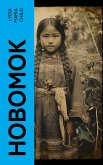Lydia Maria Child's novel, 'Hobomok', offers a unique perspective on the complexities of interracial relationships in colonial America. Written in a captivating and emotionally charged literary style, the book delves into the forbidden love between Mary Conant and the Native American character, Hobomok. Child's narrative skillfully navigates themes of identity, prejudice, and cultural clashes within the historical context of early American society. The novel serves as both a powerful love story and a thought-provoking exploration of social norms and racial dynamics of the time. Critics have praised Child's ability to humanize characters from different backgrounds and provoke readers to reflect on the impact of societal expectations on personal relationships. Lydia Maria Child's background as an active abolitionist and advocate for women's rights undoubtedly informs her portrayal of the characters' struggles against societal constraints. 'Hobomok' is highly recommended for readers interested in historical fiction that challenges conventional narratives and offers a fresh perspective on the complexities of love and identity in early America.
Dieser Download kann aus rechtlichen Gründen nur mit Rechnungsadresse in A, B, BG, CY, CZ, D, DK, EW, E, FIN, F, GR, H, IRL, I, LT, L, LR, M, NL, PL, P, R, S, SLO, SK ausgeliefert werden.









